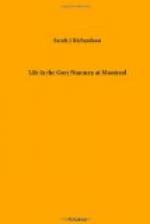renewed his protestations, and clothed them with such
a semblance of honesty and truth, that when he ended
with this tender conclusion, ‘Be assured, my
son, that I love you,’ my anger vanished. *
* * I lost sight of the Jesuit, and thought I was
addressing a man, a being capable of sympathising
in the distresses of others. ‘Ah, well,
father,’ said I, ’I need some one on whom
I can rely, some one towards whom I can feel kindly;
I will therefore place confidence in your words.’”
After some further conversation, Ciocci was asked if
he wished to leave that place. “If I desire
it!” he replied, “what a strange question!
You might as well ask a condemned soul whether he
desires to escape from hell!” At these words
the Jesuit started like a goaded animal, and, forgetting
his mission of deceiver, with, knit brows and compressed
lips, he allowed his ferocious soul for one moment
to appear; but, having grown old in deceit, he immediately
had the circumspection to give this movement of rage
the appearance of religious zeal, and exclaimed, “What
comparisons are these? Are you not ashamed to
assume the language of the Atheist? By speaking
in this way you clearly manifest how little you deserve
to leave this place. But since I have told you
that I love you, I will give you a proof of it by
thinking no more of those irreligious expressions;
they shall be forgotten as though they had never been
spoken. Well, the Cardinal proposes to you an
easy way of returning to your monastery.”
“What does be propose?” “Here is
the way,” said he, presenting me with a paper:
“copy this with your own hand; nothing more
will be required of you.” “I took
the paper with convulsive eagerness. It was a
recantation of my faith, there condemned as erroneous.
* * * Upon reading this, I shuddered, and, starting
to my feet, in a solemn attitude and with a firm voice,
exclaimed, ’Kill me, if you please; my life
is in your power; but never will I subscribe to that
iniquitous formulary.’ The Jesuit, after
laboring in vain to persuade me to his wishes, went
away in anger. I now momentarily expected to
be conducted to the torture. Whenever I was taken
from my room to the chapel, I feared lest some trap-door
should open beneath my feet, and therefore took great
care to tread in the footsteps of the Jesuit who preceded
me. No one acquainted with the Inquisition will
say that my precaution was needless. My imagination
was so filled with the horrors of this place, that
even in my short, interrupted, and feverish dreams
I beheld daggers and axes glittering around me; I
heard the noise of wheels, saw burning piles and heated
irons, and woke in convulsive terror, only to give
myself up to gloomy reflections, inspired by the reality
of my situation, and the impressions left by these
nocturnal visions. What tears did I shed in those
dreary moments! How innumerable were the bitter
wounds that lacerated my heart! My prayers seemed
to me unworthy to be received by a God of charity,
because, notwithstanding all my efforts to banish




